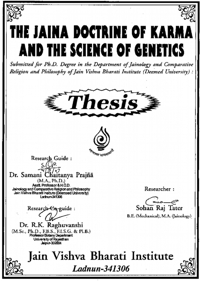Bhāvanās means contemplation, through which you motivate your soul to carry out lofty reflections. There are twelve types of Bhavanās:
- Anitya Bhavanā
All external substances including the body are transitory (anitya). They are perishable and therefore, we should not have attachment for them. - Aśaraṇa Bhāvanā
Human beings are experiencing tremendous agitation. When death occurs and the soul has to leave the body there is no one who can save a jīva who is helpless. Wealth, family, etc. have to be given up at such a time. No worldly things can provide refuge so why should we depend upon them. - Saṁsāra Bhāvanā
In the cycle of saṁsāra, mother can become wife, wife can become mother and an enemy can become friend etc. how futile is saṁsāra? We should not have attachment for it. - Ekatva Bhāvanā
"I am alone, I was born alone, I will die alone, I am sick alone, I have to suffer alone, I have to experience the karmas, which I have earned alone". Therefore one should be cautious and keep away from the attachment and hatred. - Anyatva Bhāvanā
"This body is transitory and it is different from me. I am the soul which is not perishable. While body is perishable. Even wealth, family etc. are not mine. They are different from me, therefore, I discard attachment for all these things." - Aśuci Bhāvanā
"This body is made up of impure substances. It is being nourished by impure substances. I will discard my attachments for this body and engage myself in self-discipline, renunciation and spiritual endeavours." - Āśrava Bhāvanā
Thinking on inflow of karmas. All causes that create the inflow of karmas should be discarded. - Saṁvara Bhāvanā
Saṁvara means blocking of the inflow of karmas. One must contemplate on Samiti, Gupti, Yati-dharma etc. One must carry out these activities and try to reduce or stop the new bondage of karma. - Nirjarā Bhāvanā
Nirjara means to shed whatever karmas we have, one must think of the benefits that accrue from each of the 12 kinds of Tapas or the austerities which cause nirjarā. One must contemplate on these austerities in order to destroy sins. - Lokasvabhāva Bāvanā
Lokasvabhāva means one contemplate on the three lokas, i.e. three parts of the universe namely:
(i) The upper world.
(ii) The middle world.
(iii) The lower world.
and also the whole universe filled with souls and pudgals. - Bodhidurlabah Bhāvanās
Under it one must contemplate on how difficult it is for the souls that are wandering aimlessly in four stages of existence in the saṁsāra without attaining the Jina dharma. There should not be even the slightest negligence in observing the religion propagated by the Jina. - Dharma Bhāvanā
"Oh: Arihant Bhagwan, the omniscient, has expounded and excellent sruta dharma and cāritra dharma. I will engage myself in this dharma." One should carry out this contemplation again and again. [6]
 Prof. Dr. Sohan Raj Tater
Prof. Dr. Sohan Raj Tater
 Doctoral Thesis, JVBU
Doctoral Thesis, JVBU